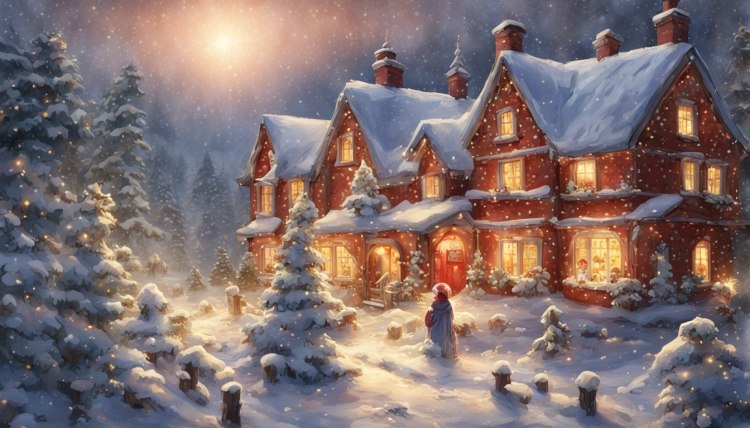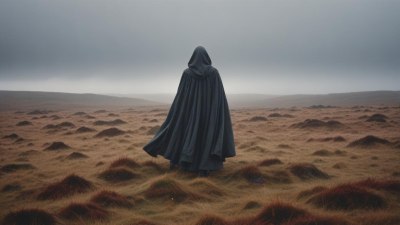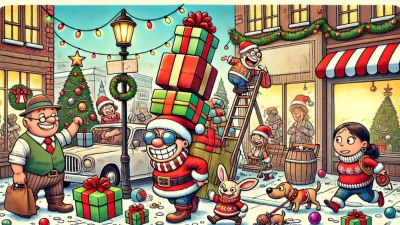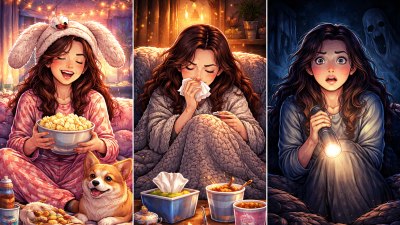The Thing of a Thousand Shapes (Mystery Story)
A young man discovers his uncle’s death may not be what it seems when supernatural phenomena and village hysteria over vampires threaten the family’s legacy. A thrilling blend of suspense, mystery, and chilling twists unfolds in a rural farmstead...
 Otis Adelbert Kline
Otis Adelbert Kline 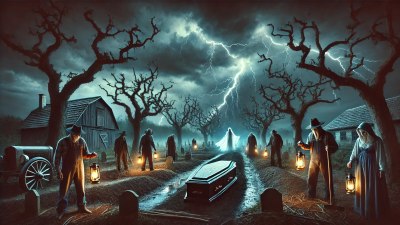
This image was created with the assistance of DALL·E
PART I.
CHAPTER I.
Uncle Jim was dead.
I could scarcely believe it, but the little yellow missive, which had just been handed to me by the Western Union messenger boy, left no room for doubt. It was short and convincing:
"Come to Peoria at once. James Braddock dead of heart failure. Corbin & His. Attorneys.”
I should explain here that Uncle Jim, my mother's brother, was my only living near relative. Having lost both father and mother in the Iroquois Theatre Fire at the ace of twelve years, I should have been forced to abandon my plans for a high school and commercial education but for his noble generosity. In his home town he was believed to be comfortably well off, but I had learned not long since that it had meant a considerable sacrifice for him to furnish the fifteen hundred dollars a year to put me through high school and business college, and I was glad when the time came for me to find employment, and thus become independent of his bounty.
My position as bookkeeper for a commission firm in South Water Street, while not particularly remunerative, at least provided a comfortable living, and I was happy in it—until the message of his death came.
I took the telegram to my employer, obtained a week's leave- of-absence, and was soon on the way to the Union Depot.
All the way to Peoria I thought about Uncle Jim. He was not old—only forty-five—and when I had last seen him he had seemed particularly hale and hearty. This sudden loss of my nearest and dearest friend was, therefore, almost unbelievable. I carried a leaden weight in my heart, and it seemed that the lump in my throat would choke me.
Uncle Jim had lived on a three-hundred-and-twenty acre farm near Peoria. Being a bachelor, he had employed a housekeeper. The farm work was looked after by a family named Severs--man, wife and two sons—who lived in the tenant house, perhaps a thousand feet to the rear of the owner's residence, in convenient proximity to the barn, silos and other farm buildings.
As I have said, my uncle's neighbors believed him to be comfortably well off, but I knew the place was mortgaged to the limit, so that the income from the fertile acres was practically absorbed by overhead expenses and interest.
Had my uncle been a business man in the true sense of the term, no doubt he could have been wealthy. But he was a scientist and dreamer, inclined to let the farm run itself while he devoted his time to study and research. His hobby was psychic phenomena. His thirst for more facts regarding the human mind was insatiable. In the pursuit of his favorite study, he had attended séances in this country and abroad with the leading spiritualists of the world.
He was a member of the London Society for Psychical Research, as well as the American Society, and corresponded regularly with noted scientists, psychologists and spiritualists. As an authority on psychic phenomena, he had contributed articles to the leading scientific publications from time to time, and was the author of a dozen well-known books on the subject.
Thus, grief-filled though I was, my mind kept presenting to me memory after memory of Uncle Jim's scientific attainments and scholarly life, while the rumbling car wheels left the miles behind; and the thought that such a man had been lost to me and to the world was almost unbearable.
I arrived in Peoria shortly before midnight, and was glad to find Joe Severs, son of my uncle's tenant, waiting for me with a flivver. After a five-mile ride in inky darkness over a rough road, we came to the farm.
I was greeted at the door by the housekeeper, Mrs. Rhodes, and one of two men, nearby neighbors, who had kindly volunteered to "set up" with the corpse. The woman's eyes were red with weeping, and her tears flowed afresh as she led me to the room where my uncle's body lay in a gray casket.
A dim kerosene lamp burned in one corner of the room, and after the silent watcher had greeted me with a handclasp and a sad shake of the head, I walked up to view the remains of my dearest friend on earth.
As I looked down on that noble, kindly face, the old lump, which had for a time subsided, came back in my throat. I expected tears, heartrending sobs, but they did not come. I seemed dazed—bewildered.
Suddenly, and apparently against my own reason, I heard myself saying aloud, "He is not dead—only sleeping."
When the watchers looked at me in amazement I repeated, "Uncle Jim is not dead! He is only sleeping."
Mrs. Rhodes looked compassionately at me, and by a meaning glance at the others said as plainly as if she had spoken, "His mind is affected."
She and Mr. Newberry, the neighbor whom I had first met, gently led me from the room. I was, myself dumfounded at the words I had uttered, nor could I find a reason for them.
My uncle was undoubtedly dead, at least as far as this physical world was concerned. There was nothing about the appearance of the pale, rigid corpse to indicate life, and he had, without doubt, been pronounced dead by a physician. Why, then, had I made this unusual, uncalled for—in fact, ridiculous—statement? I did not know. I concluded that I must have been crazed with grief—beside myself for the moment.
I had announced my intention to keep watch with Mr. Newberry and the other neighbor, Mr. Glitch, finally prevailed upon to go to my room, on the ground that my nerves were overwrought and I must have rest. It was decided, therefore, that the housekeeper, who had scarcely slept a wink the night before, and I should retire, while the two neighbors alternately kept two-hour watches, one sitting up while the other slept on a davenport near the fireplace.
Mrs. Rhodes conducted me to my room. I quickly undressed, blew out the kerosene light and got into bed. It was some time before I could compose myself for sleep, and I remember that just as I was dozing off I seemed to hear my name pronounced as if someone were calling me from a great distance:
"Billy!" and then, in the same far-away voice: "Save me, Billy!"
I had slept for perhaps fifteen minutes when I awoke with a start. Either I was dreaming, or something about the size and shape of a half-grown conger eel was creeping across my bed.
For the moment I was frozen with horror, as I perceived the white, nameless thing, in the dim light from my window. With a convulsive movement I threw the bedclothes from me, leaped to the floor, struck a match, and quickly lit the lamp. Then, taking my heavy walking-stick in hand, I advanced on the bed.
Moving the bed-clothing cautiously with the stick and prodding here and there I at length discovered that the thing was gone. The door was closed, there was no transom, and the window was screened. I therefore concluded that it must still be in the room.
With this thought in mind, I carefully searched every inch of space, looking under and behind the furniture, with the lamp in one hand and stick in the other. I then removed all the dresser drawers and found-nothing!
After completely satisfying myself for the that the animal I had seen, or perhaps seemed to see, could not possibly be in the room, I decided that I had been suffering from a nightmare, and again retired. Because of my nervousness from the experience, I did not again blow out the light, but instead turned it low.
After a half hour of restless turning and tossing, I succeeded in going to sleep; this time for possibly twenty minutes, when I was once more aroused. The same feeling of horror came over me, as I distinctly heard a rolling, scraping sound beneath my bed. I kept perfectly still and waited while the sound went on. Something was apparently creeping underneath my bed, and it seemed to be moving toward the foot, slowly and laboriously.
Stealthily I sat up, leaned forward and peered over the foot- board. The sounds grew more distinct, and a white, round mass, which looked like a porcupine rolled into a ball with bristles projecting, emerged from under my bed. I uttered a choking cry of fright, and the thing disappeared before my eyes!
Without waiting to search the room further. I leaped from the bed to the spot nearest the door, wrenched it open, and started on a run for the living-room, attired only in pajamas. As I neared the room, however, part of my lost courage came back to me, and I slowed down to a walk. I reasoned that a precipitate entrance into the room would arouse the household, and that possibly, after all, I was only the victim the of a second nightmare. I resolved, therefore, to say nothing to the watchers about my experience, but to tell them only that I was unable to sleep and come down for company. Newberry met me at the door,
"What's the matter?" he asked. "You look pale. Anything wrong?'
"Nothing but a slight attack of indigestion. Couldn't sleep, so I came down for company."
"You should have brought a dressing-gown or something. You may take cold."
"Oh. I feel quite comfortable enough," I said.
Newberry stirred the logs in the fireplace to a blaze, and we moved our chairs close to the flickering circle of warmth. The dim light was still burning in the corner of the room, and Glitch was snoring on the davenport.
"Funny thing," said Newberry, "the instructions your uncle left."
"Instructions? What instructions?" I asked.
"Why, didn't you know? But of course you didn't. He left written instructions with Mrs. Rhodes that in case of his sudden death his body was not to be embalmed, packed in ice, or preserved in any way, and that it was not to be buried under any consideration, until decomposition had set in. He also ordered that no autopsy should be held until it had been definitely decided that putrefaction had taken place."
"Have these instructions been carried out?" I asked.
"To the letter," he replied.
"And how long will it take for putrefaction to set in?"
"The doctors say it will probably be noticed in twenty-four hours."
I reflected on this strange order of my uncle's. It seemed to me that he must have feared being buried alive, or something of the sort, and I recalled several instances, of which I had heard, where bodies, upon being exhumed, were found turned over in their coffins, while others had apparently torn their hair and clawed the lid in their efforts to escape from a living tomb.
I was beginning to feel sleepy again and had just started to doze, when Newberry grasped my arm.
"Look!" he exclaimed, pointing toward the body.
I looked quickly and seemed to see something white for an instant, near the nostrils.
"Did you see it?" he asked breathlessly.
"See what?" I replied, wishing to learn if he had seen the same thing I had.
"I saw something white, like a thick vapor or filmy veil, come out of his nose. When I spoke to you it seemed to jerk back. Didn't you see it?"
"Thought I saw a white flash there when you spoke, but it must have been imagination."
The time had now arrived for Glitch to watch, so my companion wakened him, and they exchanged places. Newberry was soon asleep, and Glitch, being a stoical German, said little. I presently became drowsy, and was asleep in my chair in a short time.
A cry from Glitch brought me to my feet. "Vake up and help catch der cat!"
"What cat?" demanded Newberry, also awakening.
"Der big vite cat," said Glitch, visibly excited. "Chust now he came der door through and yumped der coffin in."
The three of us rushed to the coffin, but there was no sign of a cat, and everything seemed undisturbed.
"Dot's funny," said Glitch. "Maybe it's hiding someveres in der room."
We searched the room, without result.
"You've been seeing things," said Newberry
"What did the animal look like?" I asked.
"Vite, und big as a dog. It kommt der door in, so, und galloped across der floor, so, und yumped in der casket chust like dot Ach! It vos a fierce-looking beast."
Glitch was very much in earnest and gesticulated rapidly as he described the appearance and movements of the feline. Perhaps I should have felt inclined to laugh, had it not been for my own experience that night. I noticed, too, that Newberry's expression was anything but jocular.
It was now nearly four o'clock, time for Newberry to watch, but Glitch protested that he could not sleep another wink, so the three of us drew chairs up close to the fire. On each side of the fireplace was a large window. The shades were completely drawn and the windows were draped with heavy lace curtains. Happening to look up at the window to the left. I noticed something of a mouse-gray color hanging near the top of one of the curtains. As I looked, I fancied I saw a slight movement as of a wing being stretched a bit and then folded, and the thing took on the appearance of a large vampire bat, hanging upside down.
I called the attention of my companions to our singular visitor, and both saw it as plainly as I.
"How do you suppose he got in?" asked Newberry.
"Funny ve didn't see him before," said Glitch.
I picked up the fire-tongs and Newberry seized the poker. Creeping softly up to the curtain, I stood on tiptoe and reached up to seize the animal with the tongs. It was too quick for me, however, and fluttered out of my reach. There followed a chase around the room, which lasted several minutes. Seeing that it would be impossible for us to capture the creature by this method, we gave up the chase, whereupon it calmed down and suspended itself from the picture molding, upside down.
On seeing this, Glitch, who had taken a heavy book from the table, hurled it at our unwelcome visitor. His aim was good, and the thing uttered a squeak as it was crushed against the wall.
At this moment I thought I heard a moan from the direction of the casket, but could not be certain.
Newberry and I rushed over to where the book had fallen, intent on dispatching the thing with poker and tongs, but only the book lay on the floor. The creature had completely disappeared.
I picked up the book, and noticed, as I did so, a grayish smear on the back cover. Taking this over to the light, we saw that it had a soapy appearance. As we looked, the substance apparently became absorbed, either by the atmosphere or into the cloth cover of the book. There remained, however, a dry, white, faintly-defined splotch on the book cover.
"What do you make of it?" I asked them.
"Strange!" said Newberry.
I turned to Glitch, and noticed for the first time that his eyes were wide with fear. He shook his head and cast furtive glances toward the casket.
"What do you think it is?" I asked.
"A vampire, maybe. A real vampire."
"What do you mean by a real vampire?"
Glitch then described how, in the folklore of his native land, there were stories current of corpses which lived on in the grave. It was believed that the spirits of these corpses assumed the form of huge vampire bats at night, and went about sucking the blood of living persons, with which they would return to the grave from time to time and nourish the corpse. This proceeding was kept up indefinitely, unless the corpse were exhumed and a stake driven through the heart.
He related, in particular, the story of a Hungarian named Arnold Paul, whose body was dug up after it had been buried forty days. It was found that his cheeks were flushed with blood, and that his hair, beard and nails had grown in the grave. When the stake was driven through his heart, he had uttered a frightful shriek and a torrent of blood gushed from his mouth.
This vampire story seized on my imagination in a peculiar way. I thought again of my uncle's strange request regarding the disposition of his body, and of the strange apparitions I had seen. For the moment I was a convert to the vampire theory.
My better judgment, however, soon convinced me that there could not be such a thing as a vampire, and, even if there were, a man whose character had been so noble as that of my deceased uncle would most certainly never resort to such hideous and revolting practices.
We sat together in silence as the first faint streaks of dawn showed in the east. A few minutes later the welcome aroma of coffee and frying bacon greeted our nostrils, and Mrs. Rhodes came into announce that breakfast was ready.
After breakfast, my newly-made friends departed for their homes, both assuring me that they would be glad to come and watch with me again that night.
However, I read something in the uneasy manner of Glitch which led me to believe that I could not count on him and I was, therefore, not greatly surprised when he telephoned me an hour later, stating that his wife was ill, and that he would not be able to come.
CHAPTER II.
I strolled outdoors to enjoy a cigar, comforted by the rays of the morning sun after my night's experience.
It was pleasant, I reflected, to be once more in the realm of the natural, to see the trees attired in the autumn foliage, to feel the rustle of fallen leaves underfoot, to fill my lungs with the spicy, invigorating October air.
A gray squirrel scampered across my pathway, his cheek-pouches bulging with acorns. A flock of blackbirds, migrating southward, stopped for a few moments in the trees above my head, chattering vociferously; then resumed their journey with a sudden whirr of wings and a few hoarse notes of farewell.
"It is but a step," I reflected, "from the natural to the supernatural."
This observation started a new line of thought. After all, could anything be supernatural—above nature? Nature, according to my belief, was only another name for God, eternal mind, omnipotent, omnipresent, omniscient ruler of the universe. If He were omnipotent, could anything take place contrary to His laws? Obviously not.
The word "supernatural" was, after all, only an expression invented by man, in his finite ignorance, to define those things which he did not understand. Telegraphy, telephony, the phonograph, the moving picture—all would have been regarded with superstition by an age less advanced than ours. Man had only to become familiar with the laws governing them, in order to discard the word "supernatural" as applied to their manifestation.
What right, then, had I to term the phenomena, which I had just witnessed, supernatural? I might call them supernormal, but to think of them as supernatural would be to believe the impossible: namely, that that which is all-powerful had been overpowered.
I resolved, then and there, that if further phenomena manifested themselves that night. I would, as far as it were possible, curb my superstition and fear, regard them with the eye of a philosopher, and endeavor to learn their cause, which must necessarily be governed by natural law.
A gray cloud of dust and the whirring of a motor announced the coming of an automobile. The next minute an ancient flivver, with whose bumps of eccentricity I had gained some acquaintance, turned into the driveway and stopped opposite me. Joe Severs, older son of my uncle's tenant, stepped out and came running toward me.
"Glitch's wife died this morning," he panted, "and he swears Mr. Braddock is a vampire and sucked her blood."
"What rot!" I replied. "Nobody believes him, of course?"
"I ain't so sure of that," said Joe. "Some of the farmers are takin' it mighty serious. One of the Longdon boys, first farm north of here, was took sick this mornin'. Doctor don't know what's the matter of him. Folks say it looks mighty queer."
Mrs. Rhodes appeared on the front porch.
"A telephone call for you, sir," she said.
I hastened to the 'phone. A woman was speaking.
"This is Mrs. Newberry," she said. "My husband is dreadfully ill, and asked me to tell you that he cannot come to sit up with you tonight."
I thanked the lady, offered my condolences, and tendered my sincere wishes for her husband's speedy recovery. This done. I wrote a note of sympathy to Mr. Glitch, and dispatched Joe with it.
Here, indeed, was a pretty situation Glitch's wife dead. Newberry seriously ill, and the whole countrywide frightened by this impossible vampire story. I knew it would be useless to ask any of the other neighbors to keep watch with me. Obviously. I was destined to face the terrors of the coming night alone. Was I equal to the task? Could my nerves, already unstrung by the previous night's experience, withstand the ordeal?
I must confess, and not without a feeling of shame, that at this juncture I felt impelled to flee, anywhere, and leave my deceased uncle's affairs to shape themselves as they would.
With this idea in mind, I repaired to my room and started to pack my grip. Something fell to the floor. It was my uncle's last letter, received only the day before the telegram arrived announcing his death. I hesitated—then picked it up and opened it. The last paragraph held my attention:
And, Billy, my boy, don't worry any more about the money I advanced you. It was, as you say, a considerable drain on my resources, but I gave it willingly, gladly, for the education of my sister's son. My only regret is that I could not have done more.
Affectionately.
Uncle Jim.
A flush of guilt came over me. The reproach of my conscience was keen and painful. I had been about to commit a cowardly, dishonorable deed.
"Thank God, for the accidental intervention of that letter." I said fervently.
My resolution was firmly made now. I would see the thing through at all costs. The noble love, the generous self-sacrifice of my uncle, should not go unrequited.
I quickly unpacked my bag and walked downstairs. The rest of the day was uneventful, but the night—how I dreaded the coming of the night! As I stood on the porch and watched the last faint glow of sunset slowly fading, I wished that I. liked Joshua, might cause the sun and moon to stand still.
Twilight came on all too quickly, accelerated by a bank of heavy clouds which appeared on the western horizon: and darkness succeeded twilight with unwonted rapidity.
I entered the house and trod the hallway leading to the living-room, with much the same feeling, no doubt, that a convict experiences when entering the death cell.
The housekeeper was just placing the lamp, freshly cleaned and filled, in the room. Joe Severs' younger brother, Sam, had placed logs in the fireplace, with kindling and paper beneath them, ready for lighting. Mrs. Rhodes bade me a kindly "Good-night, sir," and departed noiselessly.
At last the dreaded moment had arrived. I was alone with the nameless powers of darkness.
I shuddered involuntarily. A damp chill pervaded the air, and I ignited the kindling beneath the logs in the fireplace. Then, drawing the shades to shut out the pitchy blackness of the night. I lighted my pipe and stood in the warm glow.
Under the genial influence of pipe and warmth, my feeling of fear was temporarily dissipated. Taking a book from the library table. I settled down to read. It was called The Reality of Materialization Phenomena, and had been written by my uncle. The publishers were Bulwer & Sons, New York and London.
It was apparently a record of the observations made by my uncle at materialization séances in this country and Europe. Contrary to my usual custom on starting a book. I read the author's introduction. He began by expressing the wish that those who might read the work should first lay aside all prejudice and all preconceived ideas regarding the subject, which were not based on positive knowledge, then weigh the facts as he had found them before drawing a definite conclusion.
The following passage, in particular, held my attention:
"While it is to be admitted, with regret, that there are many people calling themselves mediums, who deceive their sitters nightly and whose productions are consequently mere optical illusions, produced my chicanery and legerdemain, the writer has nevertheless gathered, at the sittings recorded in this book, where all possibility of fraud was excluded by rigorous examination and control, undeniable evidence that genuine materializations are, and can be, produced.
"The source and physical composition—if indeed it be physical—of a phantasm materialized by a true medium, remains, up to the present time, inexplicable. That such manifestations are not hallucinations has been proved time and again by taking photographs. One would indeed he compelled to strain his credulity to the utmost, were he to believe that a mere hallucination could be photographed.
"As I have stated, the exact nature and source of the phenomena are apparently inscrutable; however, it is a notable fact that the strongest manifestations take place when the medium is in a state of catalepsy, or suspended animation. Her hands are cold—her body becomes rigid—her eyes, if open, appear to be fixed on space—"
A roll of thunder, quickly followed by a rush of wind, rudely interrupted my reading. The housekeeper appeared in the doorway, lamp in hand.
"Would you mind helping me close the windows, sir?" she asked. "There is a big rainstorm coming, and they must be closed quickly, or the furnishings and wallpaper will be soaked."
Together we ascended the stairs. I rushed from window to window, while she lighted the way with the dim lamp. This duty attended to, she again bade me "Good-night," and I returned to the living-room.
As I entered, I glanced at the casket, then looked again while a feeling of horror crept over me. Either I was dreaming, or it had been completely draped with a white sheet during my absence.
I rubbed my eyes, pinched myself, and advanced to confirm the evidence of my eyesight by the sense of touch. As I extended my hand, the center of the sheet rose in a sharp peak, as if lifted by some invisible presence, and the entire fabric traveled upward toward the ceiling. I drew back with a cry of dread, watching it with perhaps the same fascination that is experienced by a doomed bird or animal looking into the eyes of a serpent that is about to devour it.
The point touched the ceiling. There was a crash of thunder, accompanied by a blinding flash of lightning which illuminated the room through the sides of the ill-fitting window-shades, and I found myself staring at the bare ceiling.
Walking dazedly to the fireplace, I poked the logs until they blazed, and then sat down to collect my thoughts. Torrents of rain were beating against the window panes. Thunder roared and lightning flashed incessantly.
I took up my pipe and was about to light it when a strange sight interrupted me. Something round and flat, about six inches in diameter, and of a grayish color, was moving along the floor from the casket toward the center of the room. I watched it, fascinated, while the blood seemed to congeal in my veins. It did not roll or slide along the floor, but seemed rather to flow forward.
It reminded me, more than anything else, of an amoeba, one of those microscopic, unicellular animalculae which I had examined in the study of zoology: an amoeba magnified, perhaps, several million diameters. I could plainly see, it put forth projections, resembling pseudopods, from time to time, and again withdraw them quickly into the body mass.
The lighted match burned my fingers, and I dropped it on the hearth. In the meantime the creature had reached the center of the room and stopped. A metamorphosis was now taking place before my eyes. To my surprise. I beheld, in place of a magnified amoeba, a gigantic trilobite, larger, it is true, than any specimen which has ever been found, but, nevertheless, true to form in every detail.
The trilobite, in turn, changed to a brilliantly-hued star- fish with active, wriggling tentacles. The star-fish became a crab, and the crab, a porpoise swimming about in the air as if it had been water. The porpoise then became a huge green lizard that crawled about the floor.
Soon the lizard grew large webbed wings, its tail shortened, its jaws lengthened out with a pelican-like pouch beneath them, and its body seemed partially covered with scales of a rusty black color. I afterward learned that this was a phantasmic representation of a pterodactyl, or prehistoric flying reptile. To me, in my terrified condition, it looked like a creature from hell.
The thing stood erect, stretched its wings and beat the air as if to try them; then rose and circled twice about the room, flapping lazily like a heron, and once more alighted in the middle of the floor.
It folded its wings carefully, and I noticed many new changes taking place. The scales were becoming feathers—the legs lengthened out and were encased in a thick, scaly, skin. The claws thickened into two-toed feet, like those of an ostrich. The head also looked ostrich-like, while the wings were shortened and feathered, but not plumed. The bird was much larger than any ostrich or emu I have ever seen, and stalked about majestically, its head nearly touching the ceiling.
Soon it, too, stopped in the center of the room—the neck grew shorter and shorter—the feathers became fur—the wings lengthened into arms which reached below the knees, and I was face to face with a huge, gorilla-like creature. It roared horribly, casting quick glances about the room, its deep-set eyes glowing like coals of fire.
I felt that my end had come, but could make no move to escape. I wanted to get up and leap through the window, but my nerveless limbs would not function. As I looked, the fur on the creature turned to a thin covering of hair, and it began to assume a man- like form. I closed my eyes and shuddered.
When I opened them a moment later, I beheld what might have been the "missing link," half man, half beast. The face, with its receding forehead and beetling brows, was apelike and yet manlike. Wrapped about its loins was a large tiger skin. In its right hand it brandished a huge, knotted club.
Gradually it became more manlike and less apelike. The club changed to a spear, the spear to a sword, and I beheld a Roman soldier, fully accoutered for battle, with helmet, armor, target and sandals.
The Roman soldier became a knight, and the knight a musketeer. The musketeer became a colonial soldier.
At that instant there was a crash of glass, and the branch of a tree projected through the window on the right of the fireplace. The shade flew up with a snap, and the soldier disappeared, as a brilliant Hash of lightning illuminated the room.
I rushed to the window, and saw that the overhanging limb of an elm had been broken off by the wind and hurled trough the glass. The rain was coming in in torrents.
The housekeeper, who had heard the noise, appeared in the doorway. Seeing the rain blowing in at the window, she left and returned a moment later with a hammer, tacks and a folded sheet. I tacked the sheet to the window-frame with difficulty, on account of the strong wind, and again pulled down the shade.
Mr. Rhodes retired.
I consulted my watch. It lacked just one minute of midnight.
Only half of the night gone! Would I be strong enough to endure the other half?
PART 2
CHAPTER III.
The storm slowly abated, and finally died down altogether, succeeded by a dead calm.
An hour passed without incident, to my inestimable relief. I believed that the phenomena had passed with the storm. The thought soothed me. I became drowsy, and was soon asleep.
Fitful dreams disturbed my slumber. It seemed that I was walking in a great primeval forest. The trees and vegetation about me were new and strange. Huge ferns, some of them fifty feet in height, grew all about in rank profusion. Under foot was a soft carpet of moss. Giant fungi, colossal toadstools, and mushrooms of varying shades and forms were everywhere.
In my hand I carried a huge knotted club, and my sole article of clothing seemed to be a tiger skin, girded about my waist and falling half way to my knees.
A queer-looking creature, half rhinoceros, half horse, ran across my pathway. Following closely behind it, in hot pursuit, was a huge reptilian monster, in outline something like a kangaroo, in size larger than the largest elephant. Its monstrous, serpentlike head towered more than twenty-five feet in the air as it suddenly stopped and stood erect on its hind feet and tail, apparently giving up the chase.
Then it espied me. Quick as a flash, I turned and ran, dodging hither and thither, floundering in the soft moss, stumbling over tangled vines and occasionally overturning a mammoth toadstool. I could hear the horrible beast crashing through the fern brakes, only a short distance behind me.
At last I came to a rocky hillside, and saw an opening about two feet in diameter. Into this I plunged headlong, barely in time to escape the frightful jaws which closed behind me with a terrifying snap. I lay on the ground, panting for breath, in the far corner of the cave and just out of reach of the ferocious monster. It appeared to be trying to widen the opening with its huge front feet...
Someone had laid a hand on my arm and was gently trying to awaken me. The cave and the horrible reptile disappeared, and I was again in my uncle's living-room. I turned, expecting to see Mrs. Rhodes, but saw no one.
There was, however, a hand on my arm. It ended at the wrist in a sort of indescribable, filmy mass. I was now fully awake, and somewhat startled, as may be imagined. The hand withdrew and seemed to float through the air to the other side of the room.
I now observed in the room a sort of white vapor, from which other hands were forming. Soon there were hands of all descriptions and sizes. They were constantly in motion, some of them flexing the fingers as if to try the newly-formed muscles, others beckoning, and still others clasped in pairs, as if in greeting.
There were large, horny masculine hands, daintily-formed womanly hands, and active, chubby little hands like those of children. Some of them were perfectly modeled. Others, apparently in the process of formation, looked like floating bits of chiffon, while still others had the appearance of flat, empty gloves.
Two well-developed hands now emerged from the mass and moved a few feet toward me. They waved as if attempting to attract my attention, and then I could see they were forming letters of the deaf and dumb alphabet. They spelled my name:
"B-I-L-L-Y."
Then:
"S-A-V-E M-E B-I-L-L-Y."
I managed to ask, "Who are you?"
The hands spelled: "I A-M—"
Then they were withdrawn, with a jerk, into the group.
I could now see a new transformation taking place. The hands were drawn together, dissolving into a white, irregular fluted column, surmounted by a dark, hairy-looking mass. A bearded face seemed to be forming at the top of the column, which was now widening out considerably, taking on the semblance of a human form. In a moment a white-robed figure stood there, the eyes turned upward and inward as if in fear and supplication, the arms extended toward me.
The apparition began slowly to advance in my direction. It seemed to glide along as if suspended in the air. There was no movement of walking, just a slow, floating motion.
The phantom, when at the other end of the room, had seemed frightful enough, but to see it coming toward me was unnerving—terrifying.
The nearer it approached, the more horrible it seemed, and the more firmly I appeared rooted to the spot.
Soon it was towering above me. The eyes rolled downward and seemed to look through mine into my very brain. The arms were extended to encircle me, when the instinct of self-preservation came to my rescue.
I acted quickly, and apparently without volition. Overturning my chair and rushing from the room, I ran out the front door and down the pathway. I did not dare look back, but rushed blindly forth into the night.
Suddenly there was a brilliant glare of light. Something struck me with considerable force, and I lost consciousness.
When I regained my senses I was lying in a bedroom, the room I had occupied in my uncle's house.
A beautiful girl was bending over me, bathing my fevered forehead from time to time with cold water. Sunlight was streaming in at the window. Outside, a robin was singing his morning song, his farewell to the Northland, no doubt, as the stinging snow-laden winds of winter must soon drive him southward.
I attempted to sit up, but sank back with a groan, as a sharp pain shot through my right side.
My fair attendant laid a soft hand on my brow.
"Ton mustn't do that again," she said. "The telephone wires are down, so father has driven to town for the doctor."
Memories of the night returned. The apparition—my rush down the pathway—the blinding light—the sudden shock—and then oblivion.
"Do you mind telling me," I asked, "what it was that knocked me out, and how you came so suddenly to my rescue?"
"It was our car that knocked you out," she replied, "and it was no more than right that I should do what I could to make you comfortable until the doctor arrives."
"Please tell me your name—won't you?—and how it all happened."
"My name is Ruth Randall. My father is Albert Randall, dean of the local college. We had motored to Indianapolis, intending to spend the week-end with friends, when we were notified of your uncle's death. He and my father were bosom friends, and together conducted many experiments in psychical research. Naturally we hurried home at once, in order to attend the funeral.
"We expected to make Peoria by midnight, but the storm came, and the roads soon were almost impassable. It was only by putting on chains and running at low speed most of the time that we were able to make any progress. Just as we were passing this house, you rushed in front of the car.
"Father says it is fortunate that we were compelled to run at low speed, otherwise you would have been instantly killed. We brought you to the door and aroused the housekeeper, who helped us get you to your room. Father tried to phone for a doctor, but it was no use, as the lines were torn down by the storm, so he drove to town for one. I think that is he coming now. I hear a motor in the driveway."
A few moments later two men entered—Professor Randall, tall, thin, slightly stooped, and pale of face, and Doctor Rush, of medium height and rather portly. The doctor wore glasses with very thick lenses, through which he seemed almost to glare at me. He lost no time in taking my pulse and temperature, pushing the pocket thermometer into my mouth with one hand, and seizing my wrist with the other.
He removed the thermometer from my mouth, then, holding it up to the light and squinting for a moment said "Humph" and proceeded to paw me over in search of broken bones. When he started manhandling my right side I winced considerably. He presently located a couple of fractured ribs.
After a painful half-hour, during which the injured ribs were set, he left me with instructions to keep as still as possible, and let nature do the rest.
The professor lingered for a moment, and I asked him to have Doctor Rush examine my uncle's body for signs of decomposition, as it was now more than three days since his death.
Miss Randall, who had left the room during the examination, came in just as her father was leaving, and said nice, sweet, sympathetic things, and fluffed up my pillow for me and smoothed back my hair; and if the doctor had taken my pulse at that moment he would have sworn my auricles and ventricles were racing each other for the world's championship.
"After all," I thought, "having one's ribs broken is not such an unpleasant experience."
Then her father entered—and my thoughts were turned into new channels.
"Doctor Rush has made a thorough examination," he said, "and can find absolutely no sign of decomposition on your uncle's body. He frankly admits that he is puzzled by this condition, and that it is a case entirely outside his previous experience. He states that, from the condition of the corpse, he would have been led to believe that death took place only a few hours ago."
"If you can spare the time," I said, "and if it is not asking too much, I should like to have you spend the day with me. I have much to tell you, and many strange things have happened on which I sorely need your advice and assistance. Joe Severs can take the doctor home."
The professor kindly consented to stay, and his daughter went downstairs to locate Joe and his flivver.
"The things of which I am about to tell you," I began, "may seem like the visions of an opium-eater, or the hallucinations of a deranged mind. In fact, they have even made me doubt by own sanity. However, I must tell someone, and as you are an old and valued friend of my uncle's, I feel that whether or not you accept my story as a verity you will be a sympathetic listener, and can offer some explanation—if, indeed, it be possible to explain such singular happenings."
I then related in detail everything that had happened since my arrival at the farm, up to the moment when I rushed headlong in front of his automobile.
He listened attentively, but whether he believed my narrative or not I could not tell. When I had finished, he asked many questions about the various phenomena I had witnessed, and seemed particularly interested when I told him about the disappearance of the bat. He asked me where the book, which had been used to dispatch the creature, might be found, and immediately went, downstairs, bringing it up a moment later.
A dry, white smudge was still faintly discernible on the cover. This he examined carefully with a pocket microscope, then said:
"I will have to put this substance under a compound microscope, and also test it chemically in my laboratory. It may be the means of explaining all of the phenomena you have witnessed. I will drive home this afternoon and make a thorough examination of this sample."
"I should be very glad indeed," I replied, "to have even some slight explanation of these mysteries."
"You are undoubtedly aware," he said, "that there are no vampires or similar bats indigenous to this part of the world. The only true vampire bat is found in South America, although there is a type of frugivorous bat slightly resembling it, which inhabits the southeast coast of Asia and the Malayan Archipelago, and is sometimes erroneously called a vampire or spectre bat. You have described in detail a creature greatly resembling the true vampire bat, but it is probable that what you saw was no bat at all. What it really was, I hesitate to say until I have examined the substance on this book cover."
"Well, whatever it was, I am positive it was no real vampire, as Glitch says," I replied.
"I don't like this vampire story that is being circulated by Glitch," said the professor. "It may lead to trouble. It is most surprising to find such crude superstition prevailing in these modern times."
At this juncture there was a rap at my door. I called, "Come in," and Joe Severs entered.
"Well. Joe, did you get the doctor home without shaking any of his teeth loose?" I asked.
"Yes, sir, I got him home all right, but that ain't what I come to tell you about," he replied. "There's a heap of trouble brewin' around these parts an' I thought I better let you know. Somebody's sick in nearly every family in the neighborhood, an' they're savin' Mr. Braddock is the cause of it. They're holdin' an indignation meetin' up to the school house now."
"This is indeed serious," said the professor. "Do you know what they propose to do about it?"
"Can't say as to that, but they're sure some riled up about it," replied Joe.
Mrs. Rhodes came in with my luncheon, and announced to the professor that Miss Ruth awaited him in the dining-room below, whereupon he begged to be excused. Joe went out murmuring something about having to feed the horses, and I was left alone to enjoy a very tasty meal.
CHAPTER IV.
A half hour later the housekeeper came in to remove the dishes, and Miss Randall brought me a huge bouquet of autumn daisies.
"Father has driven to town to analyze a sample of something or other that he has found," she said, "and in the meantime I will do my best to make the hours pass pleasantly for you. What do you want me to do? Shall I read to you?"
"By all means," I replied. "Read, or talk, or do anything you like. I assure you I am not hard to amuse."
"I think I shall read," she decided. "What do you prefer? Fiction, history, mythology, philosophy? Or perhaps," she added, "you prefer poetry."
"I will leave the selection entirely to you," I said. "Read what interests you, and I will be interested."
"Don't be too sure of that," she answered, and went down to my uncle's library.
She returned a few moments later with several volumes. From a book of Scott's poems, she chose "Rokeby" and soon we were conveyed, as if by a magic carpet, to medieval Yorkshire with its moated castles, dense forests, sparkling streams, jutting crags and enchanted dells.
She had finished the poem, and we were chatting gaily, when Mrs. Rhodes entered.
"A small boy brought this note for you, sir," she said, handing me a sealed envelope.
I tore it open carelessly, then read:
Mr. William Ansley.
Dear Sir:
Owing to the fact that at least one member of nearly every family in this community has been smitten with a peculiar malady, in some instances fatal, since the death of James Braddock, and in view of the undeniable evidence that the corpse of the aforesaid has become a vampire, proven by certain things which you, in company with two respected and veracious neighbors witnessed, an indignation meeting was held today, attended by more than one hundred residents, for the purpose of discussing ways and means of combating this terrible menace to the community.
Tradition tells us that there are two effective ways for disposing of a vampire. One is by burning the corpse of the offender, the other is by burial with a stake driven through the heart. We have decided on the latter as the more simple and easily carried out.
You are therefore directed to convey the corpse to the pine grove which is situated a half mile back from the road on your uncle's farm, where you will find a grave ready dug, and six men who will see that the body is properly interred. You have until eight o'clock this evening to carry out these instructions.
To refuse to do as directed, will avail you nothing. IF YOU DO NOT BRING THE BODY WE WILL COME AND GET IT. If you offer resistance, you do so at your peril, as we are armed, and we mean business.
The Committee.
P.S. No use to try to telephone or send a messenger for help. Your wires are out of commission and the house is surrounded by armed sentinels.
As the professor had predicted, this was indeed a most serious turn of events. I turned to Mrs. Rhodes.
"Where is the bearer of this letter?" I asked. "Did he wait for a reply?"
"It was given to me by a small boy." she answered. "He said that if you wished to reply, to put your letter in the mail-box, and it would be given to the right party. There was a closed automobile waiting for him in front of the house, and he ran back to it and was driven away at high speed."
"I must dress and go downstairs at once," I said.
"You must do no such thing," replied Miss Randall. "The doctor's orders are that you must keep perfectly quiet until your ribs heal."
I heard a swift footfall on the stairs, and a moment later the professor entered the room, very much excited.
"Two farmers," he said, "poked shotguns in my face and searched me on the public highway. That's what just happened to me!"
"What do you suppose they were after?" I asked.
"They did not make themselves clear on that point, and they didn't take anything, so I am at a loss to explain their conduct. They merely stopped me, felt through my pockets and searched the car, then told me to drive on."
"Perhaps this will throw some light on their motive," I said, handing him the letter.
As he read it a look of surprise came over his face.
"Ah! It is quite plain, now. These were the armed guards mentioned in the postscript. It seems incredible that such superstition should prevail in this enlightened age; however, the evidence is quite too plain to be questioned. What is to be done?"
"Frankly, I don't know," I replied. "We are evidently so well watched that it would be impossible for anyone to go for help. Of course, they cannot harm my deceased uncle by driving a stake through the corpse, but to permit these barbarians to carry out their purpose would be to desecrate the memory of the best friend I ever had."
"What are they going to do?" asked Miss Randall in alarm. I handed her the letter. She read it hastily, then ran downstairs to see if the telephone was working.
"What would you say if I were to tell you there is a strong possibility that your uncle's body is not a corpse; or, in other words, that he is not really dead?" asked the professor.
"I would say that if there is the slightest possibility of that, they will make a corpse of me before they stage this vampire funeral," I replied, starting to dress.
"I am with you in that," said he, extending his hand, "and now let us examine the evidence."
"By all means," I answered.
"According to the belief of most modern psychologists," he began, "every human being is endowed with two minds. One is usually termed the objective, or conscious mind, the other the subjective, or subconscious mind. Some call it the subliminal consciousness. The former controls our waking hours, the latter is dominant when we are asleep.
"You are, no doubt, familiar with the functions and powers of the objective mind, so we will not discuss them. The powers of the subjective mind, which are not generally known or recognized, are what chiefly concern us in this instance.
"My belief that your uncle is not really dead started when I first heard your story. It was later substantiated by two significant facts. I will take up the various points in their logical order, and you may judge for yourself as to whether or not my hypothesis is fully justified.
"First, upon seeing him lying in the casket, you involuntarily exclaimed, 'He is not dead—only sleeping.' This apparently absurd statement, unsubstantiated by objective evidence, was undoubtedly prompted by your subjective mind. One of the best known powers of the subjective mind is that of telepathy, the communication of thoughts or ideas from mind to mind, without the employment of physical means. This message was apparently impressed so strongly on your subjective mind that you spoke it aloud, automatically, almost without the subjective knowledge that you were talking. Assuming that it was a telepathic message, it must necessarily have been projected by some other mind. May we not, therefore, reasonably suppose that the message came from the subjective mind of your uncle?
"Then the second message. Was it not plainly from someone who knew you intimately, someone in dire need? You will recall that, just before you fell asleep, you seemed to hear the words, 'Billy! Save me, Billy.'
"And now, as to the phenomena: I must confess that I was somewhat in doubt, at first, regarding these. Not that I questioned your veracity in the least, for no man rushes blindly in front of a moving automobile without sufficient cause, but the sights which you witnessed were so striking and unusual that I felt sure they must have been hallucinations. On second thought, however, I decided it would be quite out of the ordinary for you and two other men to have the same hallucinations. It was, therefore, apparent that you had witnessed genuine materialization phenomena.
"The key to the whole situation, however, lay in the seemingly insignificant smudge on the book cover. Two years ago your uncle advanced a theory that materialization phenomena were produced by a substance which he termed 'psychoplasm.' After listening to his argument, I was convinced that he was right. Since then, we have attended numerous materialization séances, with the object of securing a sample of this elusive material for examination. It always disappears instantly when a bright light is flashed upon it, or when the medium is startled or alarmed, and our efforts in this direction have always been fruitless.
"Needless to say, when you described the deposit left on the book by the phantasmic bat, I was intensely interested. Microscopic examination and analysis show that this substance is something quite different from anything I nave ever encountered. While it is undoubtedly organic, it is nevertheless remarkably different, in structure and composition, from anything heretofore classified, either by biologists or chemists. In short, I am convinced it is that substance which has eluded us for so long, namely, psychoplasm.
"No doubt you will wonder what bearing this has on the question under discussion—that is, whether or not your uncle still lives. As far as we are able to learn, psychoplasm is produced only by, or through, living persons, and in nearly every instance it occurs only when the person acting as medium is in a state of catalepsy, or suspended animation. As most of the manifestations took place in the room where your uncle's body lay, and as he is the only one in the house likely to be in that state, I assume that your uncle's soul still inhabits his body.
"The final point, and by no means the least important, is that in spite of the time which has elapsed since his alleged death—in spite of that fact that it lay in a warm room without refrigeration or embalming fluid—your uncle's body shows absolutely no sign of decomposition."
"But how is it possible," I asked, "for a person in a cataleptic state to simulate death so completely as to deceive the most competent physicians?"
"How such a thing is possible, I cannot explain, any more than I can tell you how psychoplasm is generated. The wonderful powers of the subjective entity are truly amazing. We can only deal with the facts as we find them. Statistics show that no less than one case a week of suspended animation is discovered in the United States. There are, no doubt, hundreds of other cases which are never brought to light. As a usual thing, nowadays, the doctor no sooner pronounces the patient dead than the undertaker is summoned. Needless to say, when the arteries have been drained and the embalming fluid injected, there is absolutely no chance of the patient coming to life."
Together, we walked downstairs and entered the room where Uncle Jim lay. We looked carefully, minutely, for some sign of life, but none was apparent.
"It is useless," said the professor, "to employ physical means at this time. However, I have an experiment to propose, which, if successful, may prove my theory. As I stated previously, you are, no doubt, subjectively in mental rapport with your uncle. Your subjective mind constantly communicates with his, but you lack the power to elevate the messages to your objective consciousness. My daughter has cultivated to some extent the power of automatic writing. You can, no doubt, establish rapport with her by touch. I will put the questions."
Miss Randall was called, and upon our explaining to her that we wished to conduct an experiment in automatic writing, she readily consented. Her father seated her at the library table, with pencil and paper near her right hand. He then held a small hand mirror before her, slightly above the level of her eyes, on which she fixed her gaze.
When she had looked steadily at the mirror for a short time he made a few hypnotic passes with his hands, whereupon she closed her eyes and apparently fell into a light sleep. Then, placing the pencil in her right hand, he told me to be seated beside her, and place my right hand over her left.
We sat thus for perhaps ten minutes, when she began to write, very slowly at first, then gradually increasing in speed until the pencil fairly flew over the paper. When the bottom of the sheet had been reached, a new one was supplied, and this was half covered with writing before she stopped.
The professor and I examined the resulting manuscript. Something about it seemed strangely familiar to me. I remembered seeing those words in a book I had picked up in that same room. On making a comparison, we found that she had written, word for word, the introduction to my uncle's book, The Reality of Materialization Phenomena.
"We will now ask some questions," said the professor.
He took a pencil and paper and made a record of his questions the answers to which were written by his daughter. I have copied them verbatim, and present them below.
Q: "Who are you that writes?"
A: "Ruth."
Q: "By whose direction do you write?"
A: "Billy."
Q: "Who directs Billy to direct you to write as you do?"
A: "Uncle Jim."
Q: "How are we to know that it is Uncle Jim?"
A: "Uncle Jim will give proof."
Q: "If Uncle Jim will tell us something which he knows and we do not know, but which we can find out, he will have furnished sufficient proof. What can Uncle Jim tell us?"
A: "Remove third book from left top shelf of book case. Shake book and pressed maple leaf will fall out."
(The professor removed and shook it as directed, and a pressed maple leaf fell to the floor.)
Q: "What further proof can Uncle Jim give?"
A: "Get key from small urn on mantle. Open desk in corner and take out small ledger. Turn to page sixty and find account of Peoria Grain Company. Account balanced October first by check for one thousand two hundred forty-eight dollars and sixty-three cents."
(Again the professor did as directed, and again the written statement was corroborated.)
Q: "The proof is ample and convincing. Will Uncle Jim tell us where he is at the present time?"
A: "Here in the room."
Q: "What means shall we use to awaken him?"
A: "Uncle Jim is recuperating. Does not wish to be awakened."
Q: "But we want Uncle Jim to waken some time. What shall we do?"
A: "Let Uncle Jim alone, and he will waken naturally when the time comes."
The professor propounded several more queries, to which there were no answers, so we discontinued the sitting. Miss Randall was awakened by suggestion.
"We now have conclusive proof that your uncle is alive, and in a cataleptic state," said the professor.
"Is there no way to arouse him?" I asked.
"The best thing to do is to let him waken himself, as he directed us to do in the telepathic message. He is, as he says, recuperating from his illness and should not be disturbed. You are, perhaps, unaware that catalepsy, although believed by many people to be a disease, is really no disease at all. While it is known as a symptom of certain nervous disorders, it may accompany any form of sickness, or may even be caused by a mental or physical shock of some sort.
"It can also be induced in hypnotization by suggestion. Do not think of it as a form of sickness, but, rather, as a very deep sleep, which permits the patient much needed rest for an overburdened body and mind; for it is a well-known fact that when catalepsy intervenes in any form of sickness, death is usually cheated."
"Would it be dangerous to my uncle's health if we were to remove him to his bedroom?" I asked. "It seems to me that a coffin is rather a gruesome thing for him to convalesce in."
"Agreed," said the professor, "and I can see no particular harm in moving him, provided he is handled very gently. Ruth, will you please have Mrs. Rhodes make the room ready! Mr. Ansley and I will then carry his uncle upstairs."
While Miss Randall was doing her father's bidding we tried to contrive a way to outwit the superstitious farmers, who would arrive in a few minutes if they made good their threat.
My eye fell upon two large oak logs, which young Severs had brought for the fireplace, and I said:
"Why not weight the casket with these logs and screw the lid down? No doubt they will carry it out without opening it, and when they are well on their way we can place my uncle in your car and be out of reach before they discover the substitution."
"A capital idea," said the professor. "We will wrap the logs well so they will not rattle, and, as the casket is an especially heavy one, they will be none the wiser until it is opened at the grave."
I ran upstairs and tore two heavy comforters from my bed, and with these we soon had the logs well padded. Miss Randall called that the room was ready. The professor and I carefully lifted my uncle from the casket and were about to take him from the room, when a gruff voice commanded:
"Schtop!"
A dozen masked men, armed indiscriminately with shotguns, rifles and revolvers, were standing in the hall. We could hear the stamping of many more on the porch. I recognized the voice and figure of the leader as those of Glitch.
"Back in der coffin," he said, pointing a double-barreled shotgun at me. "Poot him back, or I blow your tam head off."
Then several other men came in and menaced us with their weapons.
CHAPTER V.
I dropped my uncle's feet and rushed furiously at Glitch, but was quickly seized and overpowered by two stalwart farmers.
The professor, however, was more calm. He laid my uncle gently on the floor and faced the men.
"Gentlemen." he said, "may I ask the reason for this sudden and unwarranted intrusion in a peaceful home?"
"Ve are going to bury dot vampire corpse mit a stake t'rough its heart. Dot's vot," replied Glitch.
"What would you do if I were to tell you that this man is not dead, but alive!" asked the professor.
"Alive or dead, he's gonna be buried tonight," said a burly ruffian, stepping up to my uncle. "One o' you guys help me get this in the coffin."
A tall, lean farmer stepped up and leaned his gun against the casket. Then the two of them roughly lifted my uncle into it and screwed down the lid.
In the meantime, another had discovered the wrapped logs, to which he called the attention of his companions.
"Well, I'll be blowed!" he said. "Thought yuh was pretty slick, didn't yuh? Thought yuh could fool us with a coupla logs! Just for that well take yuh along to the party so yuh don't try no more fancy capers."
"Gentlemen," said the professor, "do you realize that you will be committing a murder if you bury this man's body?"
"Murder, hell!" exclaimed one. "He killed my boy."
"He sucked my daughter's blood," cried another.
"An' my brother is lyin' in his death bed on account of him," shouted a third.
"Come on, let's go," said the burly ruffian. "Some o' you boys grab hold o' them handles, an' well change shifts goin' out."
"Yah. Ve vill proceed," said Glitch. "Vorwärts!"
"If you will permit me, I will go and reassure my daughter before accompanying you," said the professor. "She is very nervous and may be prostrated with fear if I do not calm her."
"Go ahead and be quick about it," said the ruffian. "Don't try no funny stunts, though, or we'll use the stake on you, too."
The professor hurried upstairs and, on his return a moment later, the funeral cortège proceeded.
It was pitch dark outside, and therefore necessary for some of the men to carry lanterns. One of these led the way. Immediately after him walked six men bearing the casket, behind which the professor and I walked with an armed guard on either side of us.
Following, were the remainder of the men, some twenty-five all told. There was no talking, except at intervals when the pall- bearers were relieved by others. This occurred a number of times, as the burden was heavy and the way none too smooth.
I walked as one in a trance. It seemed that my feet moved automatically, as if directed by a power outside myself. Sometimes I thought it all a horrible nightmare from which I should presently awaken. Then the realization of the terrible truth would come to me, engendering a grief that seemed unbearable.
I mentally reviewed the many kindnesses of my uncle. I thought of his generous self-sacrifice, that I might be educated to cope with the world; and now that the time had come when I should be of service to him—when his very life was to be taken—I was failing him, failing miserably.
I cudgeled my numb brain for some way of outwitting the superstitious farmers. Once I thought of wresting the gun from my guard and fighting the mob alone, but I knew this would be useless. I would merely delay, not defeat, the grisly plans of these men, and would be almost sure to lose my own life in the attempt. I was faint and weak, and my broken ribs pained incessantly.
All too soon, we arrived at the pine grove, and moved toward a point from which the rays of a lantern glimmered faintly through the trees. A few moments more, and we were beside a shallow grave at which the six grim sextons, masked like their companions, waited.
The casket was placed in the grave and the lid removed. Then a long, stout stake, sharply pointed with iron, was brought forward, and two men with heavy sledges moved, one to each side of the grave.
Here a discussion arose as to whether it would be better to drive the stake through the body and then replace the lid, or to put the lid on first and then drive the stake through the entire coffin. The latter plan was finally decided upon, and the lid replaced, when we were all startled by a terrible screaming coming from a thicket, perhaps a hundred yards distant. It was the voice of a woman in mortal terror.
"Help! Save me—save me!" she cried. "Oh, my God, will nobody save me?"
In a moment, all was confusion. Stake and mauls were dropped, and everyone rushed toward the thicket. The cries redoubled as we approached. Presently we saw a woman running through the underbrush, and after a chase of several minutes, overtook her. My heart leaped to my throat as I recognized Ruth Randall.
She was crouching low, as if in deadly fear of something which she seemed to be trying to push away from her—something invisible, imperceptible, to us. Her beautiful hair hung below her waist, and her clothing was bedraggled and torn. I was first to reach her side. "Ruth! What is the matter?"
"Oh, that huge bat—that terrible bat with the fiery eyes! Drive him away from me! Don't let him get me! Please! Please!"
I tried to soothe her in my arms. She looked up, her eyes distended with terror.
"There he is—right behind you! Oh, don't let him get me! Please don't let him get me!"
I looked back, but could see nothing resembling a bat. The armed men stood around us in a circle.
"There is no bat behind me," I said. "You are overwrought. Don't be frightened."
"But there is a bat. I can see him. He is flying around us in a circle now. Don't you see him flying there?" and she described an arc with her hand. "You men have guns. Shoot him. Drive him away."
Glitch spoke. "It's der vampire again. Ve'll put a schtop to dis business right now. Come on, men."
We started back to the grove. I was nonplussed—mystified. Perhaps there was such a thing as a vampire, after all. But no, that could not be. She was only the victim of overwrought nerves.
Once more we stood beside the grave. Two men were screwing down the coffin lid. The three with the stake and sledges stood ready. I saw that Miss Randall was trembling with the cold, for she had come out without a wrap, and, removing my coat, I placed it around her.
The professor stood at the foot of the grave, looking down calmly at the men. He appeared almost unconcerned.
The stake was placed on the spot, calculated to be directly above the left breast of my uncle, and the man nearest me raised his sledge to strike.
I leaped toward him.
"Don't strike! For God's sake, don't strike!" I cried, seizing his arm.
Someone hit me on the back of the head, and strong arms dragged me back. My senses reeled, as I saw first one heavy sledge descend, then another. The stake crashed through the coffin and deep into the ground beneath, driven by the relentless blows.
Suddenly, apparently from the bottom of the grave, came a muffled, wailing cry, increasing to a horrible, blood-curdling shriek.
The mob stood for a moment as if paralyzed, then, to a man, fled precipitately, stopping for neither weapons nor tools. I found temporary relief in unconsciousness...
My senses returned to me gradually. I was walking, or, rather, reeling, as one intoxicated, between Miss Randall and her father, who were helping me toward the house. The professor was carrying a lantern which one of the men had dropped, and fantastic, swaying, bobbing shadows stretched wherever its rays penetrated.
After what seemed an age of painful travel we reached the house, and Miss Randall helped me into the front room, the professor following. Sam and Joe Severs were there, and someone reclined in the large morris chair facing the fire. Mrs. Rhodes came bustling in with a steaming tea wagon.
I moved toward the fire, for I was chilled through. As I did so, I glanced toward the occupant of the morris chair, then gave a startled cry.
The man in the chair was Uncle Jim!
"Hello, Billy," he said. "How are you, my boy?"
For a moment I was speechless. "Uncle Jim!" I managed to stammer. "Is it really you, or am I dreaming again?"
Ruth squeezed my arm reassuringly. "Don't be afraid. It is really your uncle."
I knelt by the chair and felt Uncle Jim's arm about my shoulders. "Yes, it is really I, Billy. A bit weak and shaken, perhaps, but I'll soon be as sound as a new dollar."
"But how—when—how did you get out of that horrible grave!"
"First, I will ask Miss Ruth if she will be so kind as to preside over the tea wagon. Then I believe my friend Randall can recount the events of the evening much more clearly and satisfactorily than I."
"Being, perhaps, more familiar with the evening's deep-laid plot than some of those present, I accept the nomination." replied the professor, smiling, "although, in doing so, I do not want to detract one iota from the honor due my fellow plotters for their most efficient assistance, without which my plan would have been a complete failure."
Tea was served, cigars were lighted, and the professor began:
"In the first place, I am sure you will all be interested in knowing the cause of the epidemic on account of which some of our neighbors have reverted to the superstition of the dark ages. It is explained by an article in The Peoria Times, which I brought with me this afternoon, but did not have time to read until a moment ago, which states that the countryside is being swept by a new and strange malady known as 'sleeping sickness,' and that physicians have not, as yet, found any efficient means of combating the disease.
"Now for this evening's little drama. You will, no doubt, recall, Mr. Ansley, that before we joined the funeral procession, I requested a moment's conversation with my daughter. The events which followed were the result of that conversation.
"In order that the plan might be carried out, it was necessary for her first to gain the help of Joe and Sam here, and then make a quick detour around the procession. I know that there are few men who will not rush to the rescue of a woman in distress, and I asked her to call for help in order to divert the mob from the grave. She thought of the bat idea herself, and I must say it worked most excellently.
"While everyone was gone, Joe and Sam, who had stationed themselves nearby, came and helped me remove your uncle from the casket. As we did so, I noticed signs of returning consciousness, brought about in some measure, no doubt, by the rude jolting of the casket. Then the boys carried him to the house, while I replaced the lid. You are all familiar with what followed."
"But that unearthly shriek from the grave," I said. "It sounded like the cry of a dying man."
"Ventriloquism," said the professor, "nothing more. A simple little trick I learned in my high school days. It was I who shrieked."
Uncle Jim and I convalesced together.
When my ribs were knitted and his strength was restored, it was decided that he should go to Florida for the winter, and that I should have charge of the farm. He said that my education and training should make me a far more capable manager than he, and that the position should be mine as long as I desired it.
He delayed his trip, however, until a certain girl, who had made me a certain promise, exchanged the name of Randall for that of Ansley Then he left us to our happiness.
🙃
This story is part of "Weird Tales, Volume 1, Number 1, March 1923: The unique magazine" edited by Edwin Baird. Read all the stories from this enchanting collection here >>> Weird Tales!
✍✍✍
The story you've just experienced is a work of fiction, a creation of the imagination meant to entertain, provoke thought, and inspire. From the heart-fluttering highs of love stories to the spine-tingling chills of horror, these stories are unbound by the mundane. Whether you're in the mood for a quick escape or a deep dive into fantastical realms, explore the place where imagination echoes beyond the ordinary - Echoes of Imagination!












